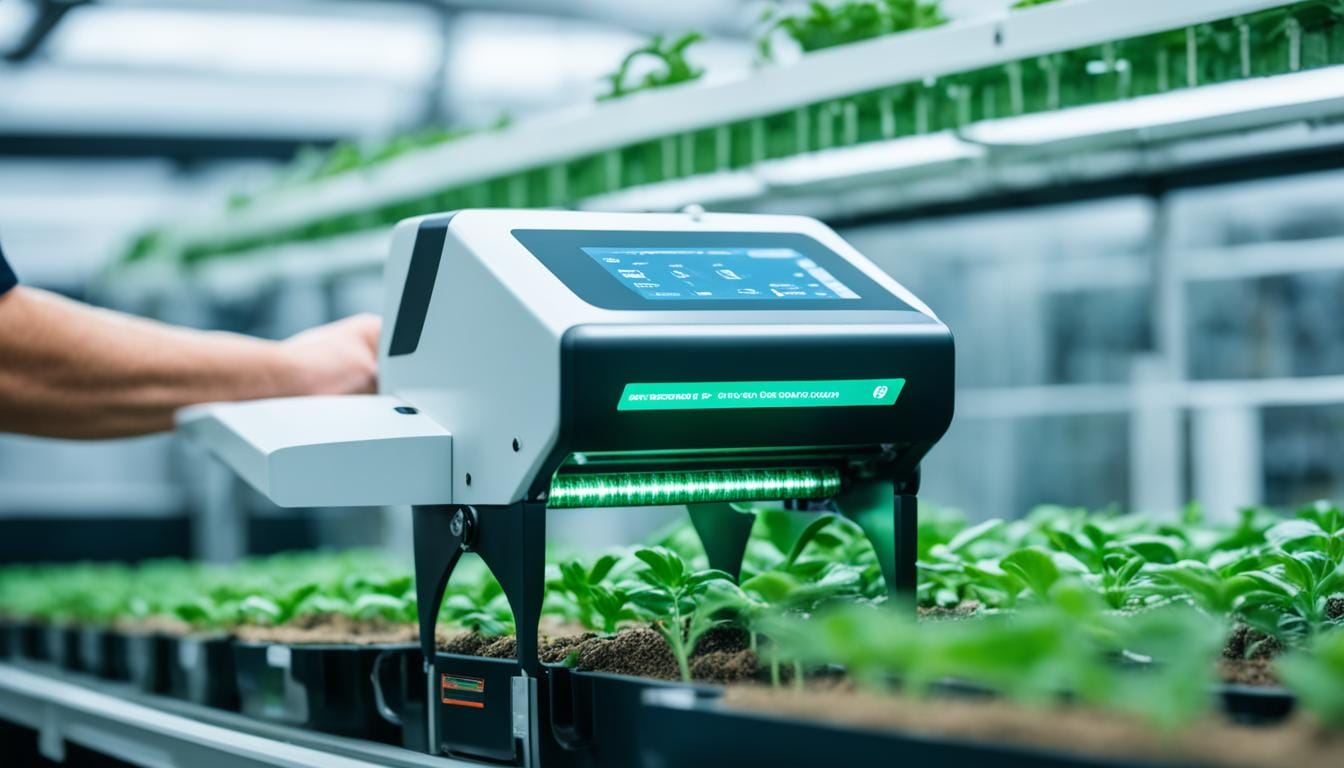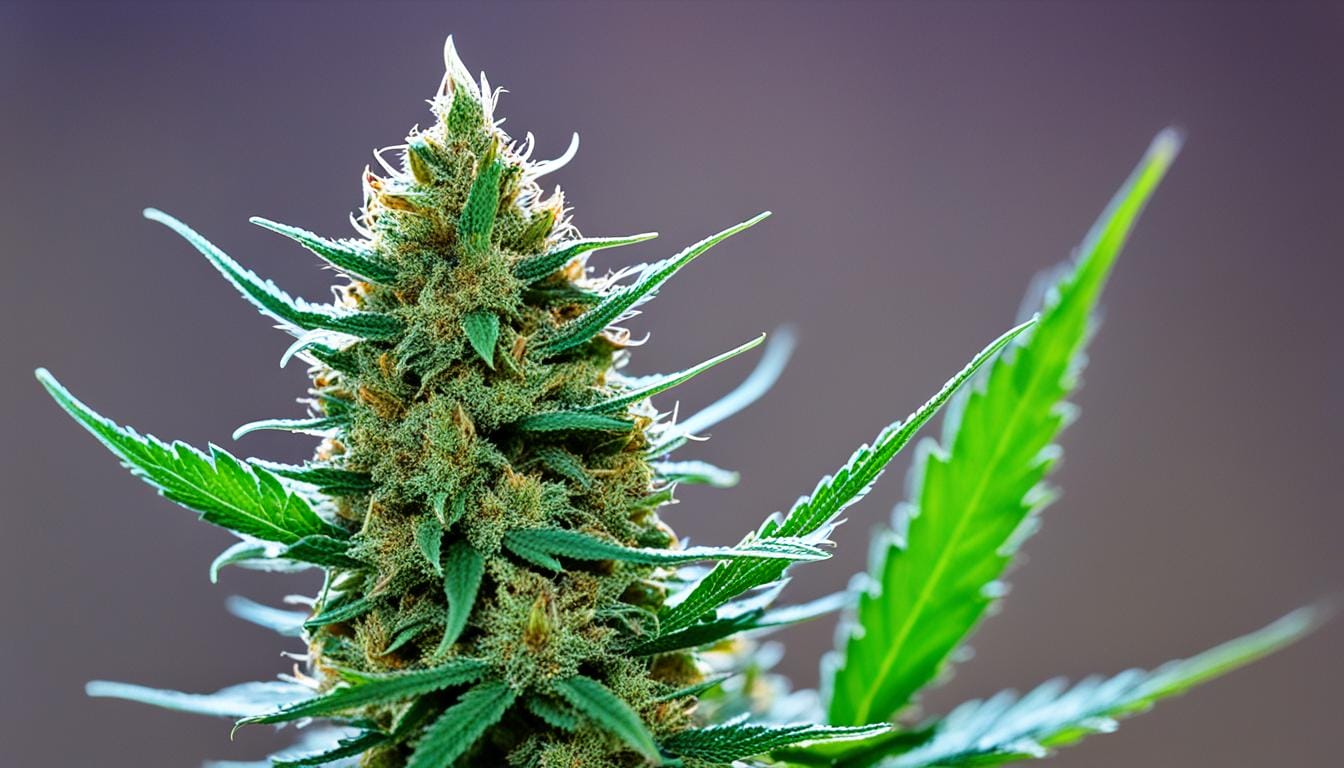Getting top-notch yields from feminized cannabis seeds comes down to one major factor: timing. When you get your planting schedule right, you’re already halfway to growing a healthy, abundant crop. Let’s break down when and how to plant feminized cannabis seeds for the results you’re aiming for. Why Planting Time Matters for Feminized Cannabis Seeds […]
Blockchain Traceability in Feminized Seed Production

Amid a booming $20.5 billion cannabis industry, an unexpected yet pivotal player emerges: blockchain traceability. In the specialized niche of feminized seed production, this technology is not just a buzzword but a paradigm-shifting tool that promises heightened integrity, transparency, and efficiency across cannabis agriculture’s supply chain management. Blockchain’s entry into this sector signals a pivotal turn towards ironclad genetic traceability, ensuring that every cultivator and consumer can trust the origin and quality of their cannabis seeds.
With the incorporation of blockchain traceability, the once opaque journey from seed creation to cultivation is now subject to a level of scrutiny and security previously unattainable in traditional feminized seed production practices. The implication of this is monumental for supply chain management within cannabis agriculture, setting a new standard for accountability at every step of the cultivation process.
The convergence of blockchain technology with the needs of feminized seed production has the potential to bridge existing gaps in the market, marrying the demand for unerring traceability with the imperative of operational efficiency. As the cannabis agriculture sector continues to grow, blockchain could well become the cornerstone of a new era characterized by trust, transparency, and traceability in feminized seed production.
Key Takeaways
- Blockchain traceability is transforming the integrity and transparency of the cannabis industry’s supply chain management.
- Feminized seed production is significantly benefiting from the introduction of blockchain for secure and transparent tracking processes.
- Supply chain management in cannabis agriculture is poised for a significant advancement with blockchain technology, ensuring trust among stakeholders.
- Traceability in the seed to sale process enhances regulatory compliance and cultivator accountability, underpinning a reliable cannabis market.
- The fusion of blockchain technology and cannabis cultivations marks a new frontier for quality assurance and operational efficiency in the industry.
Revolutionizing Cannabis Agriculture with Blockchain Technology
The infusion of blockchain technology into cannabis agriculture is more than a trend; it’s a full-scale revolution. As the legal landscape for cannabis evolves, the demand for reliable traceability solutions and efficient supply chain management systems has skyrocketed. Blockchain’s immutable ledger provides an unparalleled approach, ensuring every plant and product can be tracked from germination to the consumer.
Growers and distributors are waking up to the potential for blockchain to mitigate risks and streamline operations, creating a seed-to-sale narrative that is as transparent as it is secure. The tamper-proof nature of blockchain provides a single source of truth, allowing all parties to trust in the integrity of the data throughout every step of the process.
By leveraging blockchain, the cannabis industry can ensure that every gram of product is accounted for, reducing the risk of diversion and reinforcing regulatory compliance.
The adoption of blockchain not only bolsters trust for regulators and consumers but also opens up new avenues for innovation in cannabis farming techniques. Here’s a closer look at how blockchain is transforming core aspects of cannabis agriculture:
- Seed Quality Assurance: Blockchain technology provides mechanisms to verify the quality and genetics of strains, securing the supply of high-grade seeds to growers.
- Crop Monitoring: Introducing IoT into the cannabis farms, blockchain can offer real-time tracking of crop growth, harvesting, and handling, fortifying best farming practices.
- Regulatory Compliance: As regulations continue to evolve, blockchain enables growers to adapt quickly by streamlining the reporting process and maintaining transparent records for auditing.
Furthermore, moving beyond mere tracking and tracing, blockchain holds the key to optimizing the intricate web of distribution channels. A transparent supply chain means cutting down on overhead and eliminating unnecessary steps that lead to product degradation or increased costs.
- Traceable Distribution Networks
- Automated Compliance Updates
- Accurate Consumer Information
Finally, an optimized supply chain paves the way for a more ecological approach to cannabis agriculture, cutting down on waste and resource overuse. Blockchain can, therefore, not just revolutionize cannabis agriculture, but also contribute to making it more sustainable for future generations.
| Feature | Benefits | Impact on Cannabis Agriculture |
|---|---|---|
| Immutability | Ensures data integrity and traceability | Enhanced trust and compliance |
| Decentralization | Reduces reliance on central authorities | Empowers growers and distributors |
| Transparency | Creates an open ledger for all transactions | Facilitates regulatory compliance and consumer trust |
| Security | Protects against fraud and data breaches | Secures the pedigree of cannabis products |
In summary, by incorporating blockchain technology into their operations, businesses involved in cannabis agriculture are not only revolutionizing their practices but are setting the standard for a more transparent and accountable industry. As this technology continues to mature, we can expect to see even more innovative traceability solutions and refined supply chain management approaches in the near future.
Blockchain for Traceability in Feminized Marijuana Seed Production
The integration of blockchain for traceability is revolutionizing how the cannabis industry oversees the journey of feminized seeds from their origin to their final cultivation. This advanced application of distributed ledger technology (DLT) plays an instrumental role in reinforcing seed supply chains and guaranteeing the cannabis crop security. Let’s explore the foundational technology enabling this transformation and its substantial impact on the industry.
Understanding Distributed Ledger Technology in Seed Supply Chains
Distributed ledger technology is the bedrock on which the blockchain operates, offering an immutable and decentralized record of transactions. Within seed supply chains, this translates into an enhanced ability to track the provenance of seeds, monitor their genetic purity, and verify compliance with legal regulations. Now, stakeholders in the cannabis sphere can follow the lifecycle of feminized marijuana seeds with unparalleled precision and reliability.
The adoption of blockchain technology within seed supply chains also spearheads advancements in operational transparency. Producers, regulators, and consumers alike benefit from the real-time visibility that DLT affords, creating an ecosystem of trust and confidence, which is essential for a market that requires authenticity and quality above all.
Impact of Blockchain on Cannabis Crop Security
In the context of cannabis crop security, blockchain’s potential is particularly striking. The ability of the technology to offer an indelible record of every transaction ensures that each feminized seed’s journey is securely logged. Thus, the concerns over counterfeit seeds infiltrating the market are significantly alleviated. Farmers can rest assured that the seeds they receive are genuine, traced back to their origins through a transparent supply chain.
Critical to maintaining this level of security is the communal nature of the blockchain. Since every participant in the network has access to the distributed ledger, the validation of transactions promotes collective security. This shared vigilance is a deterrent against fraud and ensures that regulatory requirements are upheld, creating a safer market for all parties involved.
| Aspect | Traditional Tracking Methods | Blockchain-Enabled Tracking |
|---|---|---|
| Transparency | Limited visibility into seed provenance | Full visibility enabled by a shared ledger |
| Security Against Counterfeits | High risk of counterfeit seeds | Increased security with verifiable transactions |
| Regulatory Compliance | Challenging and manual verification process | Simplified compliance through immutable record-keeping |
| Stakeholder Confidence | Varies and often questionable | Strengthened by data integrity and accountability |
In conclusion, as the feminized marijuana seed industry continues to evolve, the application of blockchain for traceability solidifies its position as an indispensable tool for ensuring integrity and security within seed supply chains. From fostering trust in cannabis crop security to simplifying compliance efforts, blockchain stands at the forefront of a new agricultural era.
Key Factors in Agricultural Blockchain: From Seed to Sale
The infusion of agricultural blockchain technology into the cannabis industry is reshaping the journey of products from seed to sale. One of the most crucial aspects of this transformation is the unwavering focus on supply chain transparency. Through distributed ledgers, every individual involved—from cultivators to consumers—gains access to a comprehensive and unalterable record of product lineage.
To make the most of a blockchain’s capabilities, data standardization stands as a pillar that aligns all parties with a common language and format. This allows seamless sharing and analysis of data, fostering improved decision-making and confidence amongst stakeholders. Here’s a closer look at how these elements converge to solidify the blockchain’s value in agriculture:
| Key Factor | Description | Benefits |
|---|---|---|
| Supply Chain Transparency | Visibility into each step of the product’s journey, from cultivation to retail. | Enhanced product recall capabilities and consumer trust. |
| Data Standardization | Uniform data formats across the supply chain, allowing interoperability. | Facilitates data sharing and system integrations, reducing errors. |
| Seed to Sale Tracking | Monitoring of the product life cycle in the blockchain from inception to purchase. | Assures authenticity and compliance, deterring fraud and substantiating quality claims. |
The integration of these agricultural blockchain aspects not only refines the processes within each stage but also equips the cannabis industry with a level of integrity previously unrealized. As we delve deeper into the age of seed to sale digitization, these innovations in blockchain are heralding a new paradigm of agricultural excellence.
Bridging the Gap: Traceability and Seed Production Efficiency
In the realm of feminized seed production, blockchain technology stands as a beacon of innovation, offering transparent traceability and heightened efficiency. The concept encompasses far more than mere tracking; it delves into the genetic transparency of seeds, assuring cultivators and consumers alike of the pure genetics they cultivate or consume. By integrating smart contracts, the cumbersome manual practices previously required in the seed supply chain are streamlined, paving the way for a more efficient agricultural economy.
The Role of Transparency in Seed Genetics and Cultivation
Achieving transparency in seed genetics is paramount to successful cultivation. Blockchain technology facilitates a level of openness that was once a distant aim in the agricultural sector. With the capacity to embed comprehensive genetic information on a secure and immutable ledger, cultivators can now provide tangible proof of their seeds’ origins and pedigree, fostering traceability and efficiency in every phase of the growth cycle. This level of detail not only benefits growers but also promotes trust among consumers seeking assurances regarding the products they choose to invest in.

Smart Contracts: Automating the Seed Supply Chain
Smart contracts stand at the forefront of seed supply chain automation. These self-executing contracts with the terms of agreement directly written into code are the building blocks of a more streamlined, cost-effective supply chain. They eliminate the need for intermediaries, therefore reducing the potential for human error and expediting the transaction processes. Smart contracts can trigger automated payments or update inventory data once certain predetermined conditions are met, thus driving efficiency and reinforcing transparency in seed genetics.
In conclusion, as the cannabis cultivation landscape evolves, so too must the technologies that support it. Innovations including blockchain for traceability and efficiency, transparency in seed genetics, and the implementation of smart contracts will undoubtedly continue to shape the future of the industry. The fusion of these technological advancements and seed supply chain automation is not just bridging gaps but also constructing new avenues for cultivation excellence and market integrity.
The Role of Remote Sensing Data in Blockchain Traceability
The advent of remote sensing data has been a game-changer for several industries, agriculture being one of the prime beneficiaries. When paired with blockchain traceability, this data becomes a powerful tool for ensuring the integrity of feminized seed production.
By harnessing aerial imagery, cultivators have unparalleled visibility over their crops. This imagery, when combined with seed production data, adds a layer of verification that is vital for authenticating the provenance and quality of seeds within the supply chain.
Integrating Aerial Imagery with Seed Production Data
Aerial imagery not only provides a bird’s eye view of the cannabis fields but, more importantly, supplies actionable insights. This integration can delineate between healthy plants and those stressed by pests or disease, allowing for swift intervention. Here, machine learning tools come into play, processing vast quantities of imagery and distinguishing patterns that may escape the human eye.
Machine Learning and Predictive Analysis in Cultivation
Employing machine learning algorithms transforms remote sensing data from passive observation into a dynamic predictive model. This facet of technology is particularly illuminating in predictive analysis, where crop outcomes can be projected, and cultivation strategies are honed to perfection.
| Factor | Impact on Crop Cultivation | Relevance to Blockchain Traceability |
|---|---|---|
| Aerial Imagery | Monitors crop growth and health remotely | Visual confirmation of cultivation practices |
| Seed Production Data | Tracks genetics and harvest yields | Ensures quality and genetic purity |
| Machine Learning Analysis | Predicts crop stress and optimizes resource allocation | Enhances decision-making and evidences care in cultivation |
By implementing such technologies, growers affirm their commitment not only to quality seed production but also to the future of sustainable and transparent cannabis agriculture.
Building Consumer Trust with Digital Seed Certification
In a marketplace where product authenticity is of utmost importance, digital seed certification stands as a beacon of reliability for consumers and industry professionals alike. Utilizing blockchain technology, growers and suppliers are now able to provide verifiable evidence of the origin and quality of their feminized seeds, which is essential for building consumer trust.
The process of digital seed certification involves recording each seed’s journey from germination to sale on a blockchain ledger. This not only streamlines the tracking of the product but also ensures a level of transparency that was previously unattainable. By committing to such rigorous standards, the cannabis industry can combat the prevalent issues of counterfeit seeds and reassure customers that they are receiving a genuine product.
Blockchain-based certification confirms the product’s authenticity, genetics, and compliance with industry standards, making it a critical component of consumer confidence.

- Traceable Product Lifecycles: Every step of a seed’s lifecycle, from its genetic lineage to its cultivation conditions, can be documented on a blockchain ledger.
- Immutable Records: Once entered into the blockchain, the data cannot be altered, ensuring the integrity of the certification.
- Easy Verification: Consumers and retailers can quickly verify a seed’s authenticity and history with a simple scan of a QR code or similar digital identifier.
Embracing blockchain technology for digital seed certification not only cements a business’s commitment to transparency but also empowers consumers to make educated purchases based on trustworthy data—enhancing overall consumer trust in the ever-evolving cannabis market.
Enhancing Cannabis Seed Authenticity and Compliance
In an era where the cannabis seed sales market is expanding rapidly, ensuring the authenticity and compliance of products has never been more critical. Blockchain technology emerges as a beacon of hope, offering robust solutions to reinforce trust among consumers and stakeholders. This novel approach to cannabis seed authenticity not only upholds the integrity of the industry but also sets a new standard for regulatory compliance.
Countering Counterfeits: Securing the Seed Sales Market
The influx of counterfeit cannabis seeds poses a significant threat to cultivators and buyers alike. Blockchain technology, acting as a gatekeeper, revolutionizes counterfeit prevention in the industry. Its immutable and transparent nature ensures that every transaction along the supply chain is recorded, providing an indelible record of authenticity from origin to sale.
Regulatory Challenges and Blockchain Solutions
Regulatory compliance is a labyrinthine challenge in the dynamic and diverse global market. However, blockchain introduces an unprecedented level of accountability and traceability that aligns seamlessly with regulatory frameworks. This technology is not just a tool; it is the foundation upon which the future of the legalized cannabis industry will be built.
| Challenge | Blockchain Solution | Benefit |
|---|---|---|
| Proving Seed Authenticity | Immutable ledger entries | Verifiable proof of origin |
| Counterfeit Seeds | Cryptographic security | Reduced risk of fraud |
| Regulatory Hurdles | Standardized data | Simplified compliance processes |
| Market Fragmentation | Decentralized networks | Unified global standards |
Blockchain technology stands at the forefront of innovation, guarding the sacred trust between cannabis producers and their clientele. It is not just securing the seed sales market today but is laying the groundwork for a future where cannabis seed authenticity and regulatory compliance are inherent, undoubted heritages of the cannabis culture.
Preparing for the Future: Blockchain Adoption in the Cannabis Industry
As the cannabis industry matures, the promise of blockchain adoption shines as a beacon for innovation and security. With an eye on the future, key industry players are not only embracing technology but also strategically overcoming the barriers to integration that come with any disruptive change. It is crucial to recognize that the adoption of blockchain is more than just implementing a new system; it involves reshaping the entire infrastructure to harness the potential of this technology fully.
Overcoming Barriers to Blockchain Integration
Adopting blockchain within the complex framework of the cannabis industry demands addressing both technical and regulatory hurdles. One significant obstacle is the lack of standard protocols, which is where data standardization plays a pivotal role. Standardizing data ensures seamless communication across different platforms and entities, making the information more accessible and interoperable.
Data Standardization and Historical Analysis for Quality Assurance
Another aspect that forms the bedrock of advanced blockchain systems is historical analysis. Precise historical data provides a wealth of information that can be used to improve both cultivation strategies and supply chain efficiency. Detailed records enable growers to conduct a retrospective analysis to ascertain which cultivation practices yielded the best results and identify areas for improvement. Such analyses are indispensable for ongoing quality assurance, as they ensure that best practices are always in place, contributing to a superior end product.
| Challenges | Solutions | Benefits |
|---|---|---|
| Lack of Technical Knowledge | Education and Training Workshops | Smooth Transition to New Technologies |
| Regulatory Compliance | Collaboration with Legal Experts | Assurance of Legality and Traceability |
| Data Fragmentation | Implementation of Standard Protocols | Enhanced Data Interoperability |
| Historical Data Analysis | Use of Blockchain for Record-Keeping | Quality Improvement Insights |
In conclusion, while there are certainly challenges, the strategic application of blockchain technology stands to not only streamline operations but to potentially transform the entire cannabis industry. As we look ahead, it is the responsibility of cannabis businesses to arm themselves with knowledge, strategy, and collaborative spirit to fully embrace and optimize blockchain technology for a smarter, safer future.
Conclusion
In the realm of cannabis agriculture, the advent of blockchain traceability stands as a transformative milestone, promising a new era of transparency and integrity for feminized seed production. This technology’s prowess in providing a secure and immutable ledger makes it an invaluable asset in managing the complexities of the supply chain management. By harnessing the power of distributed ledger technology and smart contracts, cultivators and stakeholders can achieve unparalleled oversight across the cultivation process. This heightened level of scrutiny ensures that every seedling’s genesis and growth narrative is meticulously chronicled, fostering trust within the market.
As the tide of innovation ushers in a wave of blockchain solutions, the cannabis industry faces the imperative task of resolving regulatory hurdles and achieving a consensus on data standardization. Addressing these facets is crucial to crafting a cohesive framework that supports the industry’s overarching goals — streamlining operations while preserving authenticity and compliance. With collaborative efforts to implement these solutions, the industry can mitigate risks, underscore compliance with regulatory expectations, and drive consumer assurance in product quality.
The future trajectory of cannabis agriculture is palpably intertwined with the adoption of blockchain technology. Spearheading a movement towards fortified transparency, enhanced security, and boosted operational efficiency, blockchain sets the stage for a sustainable and trustworthy marketplace. It presents an opportunity for the sector to redefine how feminized seeds are tracked and traded, carving out a path of innovation and excellence in agricultural practices. The ushering in of this technology paves the way for a renaissance in the cultivation and distribution of cannabis, where every participant — from grower to consumer — can partake with confidence in the integrity and sustainability of the products they touch.
FAQ
How can blockchain technology revolutionize the cannabis agriculture industry?
Blockchain technology has the potential to enhance the traceability, transparency, and security of the cannabis agriculture industry. By incorporating blockchain into the seed supply chain, growers can improve the integrity of their crops from seed to sale.
What is the role of blockchain technology in traceability and supply chain management?
Blockchain technology allows for the tracking and verification of cannabis products throughout the supply chain, ensuring compliance and product integrity. It provides a decentralized and transparent system that enhances trust among stakeholders.
How does blockchain technology contribute to the traceability of feminized marijuana seed production?
Blockchain technology uses distributed ledger technology to track and verify genetic information in feminized marijuana seed production. It addresses concerns related to counterfeits and regulatory challenges, ensuring the security and authenticity of cannabis crops.
What are the key factors involved in implementing agricultural blockchain solutions for seed production?
Implementing agricultural blockchain solutions for seed production requires supply chain transparency, data standardization, and the adoption of blockchain technology. These factors improve efficiency and trust among stakeholders while tracking and verifying the authenticity of cannabis products.
How does blockchain technology bridge the gap between traceability and efficiency in feminized seed production?
Blockchain technology enhances traceability and efficiency in feminized seed production by enabling transparency in seed genetics and cultivation. It also utilizes smart contracts to automate processes within the seed supply chain, resulting in improved efficiency and reduced reliance on manual interventions.
What is the role of remote sensing data in enhancing blockchain traceability in feminized seed production?
Remote sensing data, such as aerial imagery, can be integrated with seed production data to provide valuable insights into crop growth, health, and productivity. By leveraging machine learning and predictive analysis, growers can optimize their operations and improve overall seed quality.
How can blockchain technology be utilized to build consumer trust through digital seed certification?
Blockchain technology can be used to digitally certify feminized seeds, ensuring their authenticity and compliance with required standards. This builds consumer trust by verifying the origin and quality of the seeds they are purchasing.
How does blockchain technology enhance the authenticity and compliance of cannabis seeds?
Blockchain technology helps secure transactions and verify the authenticity of cannabis seeds, addressing the issue of counterfeits in the seed sales market. It also offers solutions to regulatory challenges, ensuring compliance within the industry.
What are the steps required to overcome barriers to blockchain integration in the cannabis industry?
Overcoming barriers to blockchain integration in the cannabis industry involves addressing issues such as data standardization and historical analysis to ensure quality assurance throughout the seed production process. It also requires industry stakeholders to develop guidelines and best practices for blockchain implementation.
What is the future of blockchain adoption in the cannabis industry?
The future of blockchain adoption in the cannabis industry looks promising. As more growers and stakeholders recognize the benefits of blockchain technology in enhancing traceability and efficiency, the industry can pave the way for a more transparent, secure, and sustainable future.
Back



